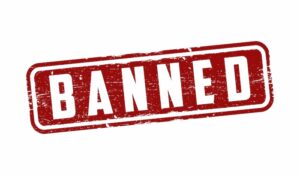How to get a Finnish IP address
The easiest way to improve your digital privacy is to switch your IP address using a VPN. We’ll …
 Thanks to the Internet, I have learned so much over the years on just about every subject I’m interested in. The depth and breadth of information and content that I could find on the Internet is astounding!
Thanks to the Internet, I have learned so much over the years on just about every subject I’m interested in. The depth and breadth of information and content that I could find on the Internet is astounding!
I feel fortunate to have the freedom to visit any website I want. Unfortunately, this privilege is not available to people from other parts of the world. With increasing freedom posing a perceived threat to established order in various parts of the world, governments in these areas have instituted thorough censorship of content both viewed and created.
Large or small, these efforts represent a concerted quashing of dissenting opinion and content deemed “unsavory” to viewers. From the United Kingdom and their web filters to the “Great Firewall of China”, countries around the world are leveraging technology against technology in an effort to curtail public dissent and shape perceptions. In this post, I will highlight what internet censorship looks like in four different countries around the world.
The UK’s censorship efforts represent a more conservative use of content filtering technology with not entirely unwelcome aims. The country’s government blocks access to sites and maintains laws that criminalize publication of libel, copyright, incitement of terrorism, and child pornography. The troubling aspect of this censorship lies in its increasing prevalence.
Efforts to curtail harmful behavior have elicited the argument that such measures limit freedom of expression, freedom of information, and protection of privacy. Internet service providers in the country use filtering technology that blocks content tagged as “pornography”, “violent”, “extremist”, “terrorist”, “eating disorder”, “suicide”, “alcohol”, “smoking”, “web form”, “esoteric material”, and “web-blocking circumvention”. Citizens have the opportunity to “opt out” of this filter, but its default application is viewed negatively by civil liberties advocates.
Restricted/blocked content:
Method:
On the opposite end of the spectrum, China maintains a wide body of regulations and laws that censor Internet access. In addition, the country cracks down on dissenting opinions to a severe extent. According to Amnesty International, China “has the largest recorded number of imprisoned journalists and cyber-dissidents in the world.” Their crimes include communicating with foreign groups abroad, signing online petitions, and calling for reform and end of corruption in government.
In addition to regulatory mandates, the country employs some of the most sophisticated Internet controls in the world. Officials can block web domains on demand and monitor Internet access of individuals in detail. The most potent tool at the government’s disposal, however, is a perception that Internet activity is being monitored at all times. For this reason, businesses and individuals willing self-censor, achieving regulatory aims through a culture of fear.
Restricted/blocked content:
Methods:
A number of motives come into play when constructing Internet censorship rules. In Iran, that motivation lies in the involvement of puritanical religious laws that place strict boundaries on socially acceptable behavior. Between these guidelines and government control of communications channels, the country finds itself on the more extreme end of Internet censorship.
The centralized authority of communications is what drives censorship efforts. Each Internet service provider that operates within Iran’s borders must receive approval from both the Telecommunication Company of Iran and the Ministry of Culture and Islamic Guidance.
“SmartFilter” software blocks access to most pornographic, gay and lesbian, reformist, news and identity cloaking sites. Each blocked site is defined as “immoral” on some grounds or another, and with comprehensive filtering technology in place, the Arab nation’s network remains one of the most highly restricted in the world.
Restricted/blocked content:
Methods:
The Democratic People’s Republic of Korea has been shrouded in secrecy for quite some time, even to its residents. With a high degree of censorship and no de facto freedom of press, the North Korean government exercises severe restriction of communications channels in order to perpetuate propaganda and craft public perception. All media outlets are owned and controlled by the government and Internet access is illegal. Only a small collective of government officials have Internet access through a secret Korean-Chinese network. The remaining citizens are limited to the country’s private Internet, called the Kwangmyong.
Restricted/blocked content:
Methods:
Internet surveillance and censorship internationally runs the gamut from minor, optional content blocking to full restriction of network access. The UK’s content blocking filter raised public ire in its inception but it pales in comparison to the oppressive monitoring and filtering of Chinese networks.
Strict religious standards and centralized communications infrastructure keep Iran’s grip on content firm, but no grip is tighter than that of the Democratic People’s Republic of Korea. Restrictions like these threaten the free-flow of Information and the democratization of knowledge!
Thanks to technology, there are ways you can circumvent your government or ISP’s censorship of the Internet. One of the best ways to overcome Internet censorship and get access to any website you want from anywhere in the world is to use a VPN.
By using VPN technology, you can access the website you want via one of the server that is in a location that has free access to the Internet (such as in the U.S.). The server then pass the content to your browser through a secure tunnel. With a VPN, you can unblock YouTube, unblock facebook, or unblock any website that has been blocked by your Internet Service Provider.
The additional advantage of using a VPN is that you can browse the Internet anonymously and noone can track your Internet activities!
